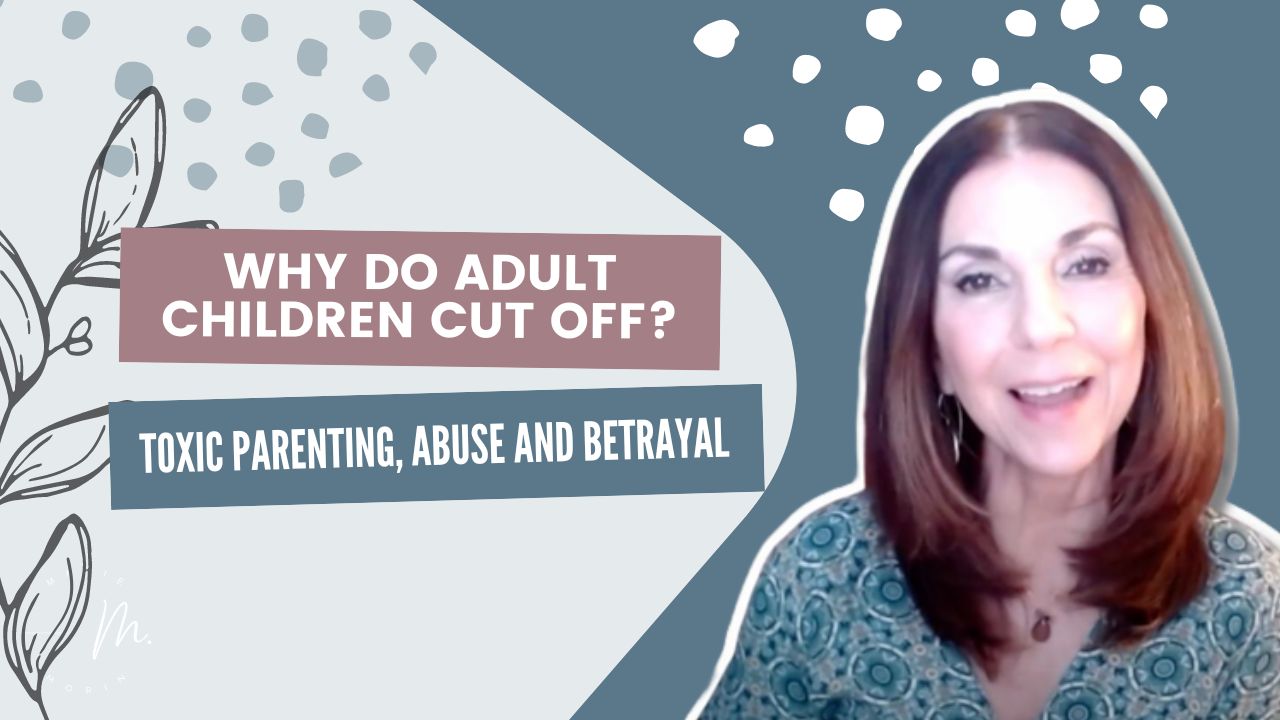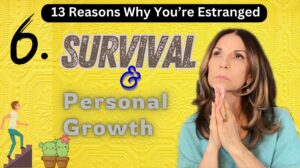Estrangement from an adult child may be one of the most grueling experiences for parents. Parents can be mystified, in denial, and distraught. Cut-off adult children are devastated.
Research indicates that most adult children cut ties to preserve themselves from continued harm. Researcher and social worker Kylie Agllias interviewed twenty-six adult kids citing toxic behaviors, abuse, poor parenting, and betrayal as the most common reason for cutting ties. In this article, we discuss why adult children cut off: toxic parenting, abuse, and betrayal.
What are the experiences of adult children who decide to exit their relationship with their parents?
What Most Estranged Adult Children Feel
Estrangement is a harrowing experience causing stress and emotional upheaval. Ideally, children should have nourishing experiences from their parents and family of origin. They receive harm from the people who were supposed to be there to supply unconditional love, support, and connection. The reported experiences of adult children who endured toxic and poor parenting, abuse, and betrayal can bring insight and empathy towards those who choose to estrange.
Childhood disconnection is the foundation of most researched adult children’s estrangement. They felt that their parental relationship was void of connection. A common theme of adult children is the perception and emotion their parents had little emotional support to offer them. Adult children said they lacked attention or felt like their parent was not present. There could have been physical disconnection due to divorce. Frequent descriptions of adult children’s participants said they felt like they were the odd ones out, didn’t fit in, and did not belong to the family unit.
Childhood and adolescence abuse is traumatizing, an emotional response to an alarming experience. Few people have not experienced a traumatic experience that leaves one with lifelong emotional scars. About 50 percent of trauma victims have some impairment or functioning problems in their social, psychological, physical, and occupational areas. Abuse, betrayal, and poor parenting impact the person’s sense of safety and stability.
Treatment for trauma includes:
- trauma-focused cognitive behavioral therapy (TF-CBT)
- cognitive processing therapy (CPT)
- prolonged-exposure therapy (PE)
- eye movement desensitization and reprocessing (EMDR)
Post-traumatic growth is the transformative process through treatment where the individual finds new strength, improved relationships, spiritual awareness, and more satisfying life.
Abuse
Abuse occurring in childhood or adolescence included physical, sexual, and emotional abuse, sometimes into adulthood. Some study participants said they suffered physical abuse by someone other than their parents, and their parents betrayed them and failed to protect them.
Other cases described when adult children told their parents of sexual abuse and were either not believed or received inappropriate responses. Some adult children told of sexual abuse their parents’ new partner perpetrated. A portion of the participants reported they suffered greatly because reporting parent’s denied the abuse and therefore did not protect them.
Most adult child participants in the study cited name calling, belittling to manipulate, and other controlling behaviors. Toxic behaviors such as disrespect, cruelty, excessive criticism, blaming children for parent’s problems, explosive shows of anger, selfishness, and being unapologetic
Parents told them they were not wanted or not planned.
Poor Parenting
Poor and toxic parenting are behaviors that are inconsistent with the child’s well-being. Disconnection or unattached parenting creates an atmosphere where the child or adolescent feels alone and unsupported.
Signs of Poor Parenting
- High Levels of Criticism
- Demanding
- Favoritism
- Shaming
- Scapegoating
- Reliance on the child for emotional and physical support
- Conditional affection and attention
- Parentification- the child or adolescent must take on the role of the parent with childcare, housework, and abnormal responsibilities for a child or adolescence
Parents that lacked interest in their kids did, not support them and were disconnected.
Estranged adult children describe their parents as self-centered, attention-seeking, manipulative, dishonest, powerful, and weak.
Betrayal
A betrayal is an act of violating one’s trust or confidence. Family secrets and lies that, when exposed, lead to pain, embarrassment, and disbelief. Some acts of betrayal include small acts of rejection of long-held secrets and more destructive acts of sabotage.
Also, adult children described examples of betrayal from a cruel public embarrassment and
undermining a relationship with others.
Adult children explained that they did not discover the betrayal until they became adults.
These adult children told about years with their parents as cycles of estrangement and reunification. They were frustrated with wanting their family and wanting to belong but having so much pain from the abuse, poor parenting, and betrayal, they gained relief by estranging.
Adult Children Speak Out
Cycles of Reunification and Estrangement
During brief periods of reunification, where adult children attempted to participate in the parental relationship, they experienced excessive demands from their parents. Adult children spoke about feeling worn down.
When there were brief reunification periods, parents did not take responsibility, nor did they recognize the harm they inflicted, nor was there any resolution.
Adult children feel internal pressure to have a relationship with their parents. They desired a better relationship but realized it was pointless to do so. They also felt external pressure from a sibling, another family member, or their partners to repair the relationship.
Adult children feel tremendous pressure when their parents are ill, alone, or in need
Internal and external pressure affects the adult kids’ ability to balance their need for self-preservation against the onslaught of forces.
Empathy For Parents
The research states that even in the cases of abuse, poor parenting, and betrayal,
adult kids felt empathy for their parents, aware that their behaviors resulted from substance use, mental illness, childhood abuse, crisis, and family instability.
While these adult kids did feel empathy, they did not excuse their parents for their
destructive behaviors. They recognized that their parents were ultimately responsible for their behaviors.
Estrangement Decision is Extremely Stressful
Adult children toil over the necessity to estrange. The study participants reported that cutting ties was not made lightly. In light of the effects of the trauma they experienced and their attempts to reunify, adult children recognized their parents would not change.
Unfortunately, many parents believe their child estranges over something unimportant. The parents who partook in the research reactions were often defensive and dismissive. Adult kids often estrange from years of painful rejection, feelings, and experiences. Adult children benefit from therapy, where they may be encouraged to cut ties [1] when they have endured psychological harm.
Please find professional support for adult children who have endured any of these behaviors.
No one ever deserves to be harmed. There is no adequate or reasonable excuse for abuse, betrayal, and poor parenting. Your therapist will best guide you toward healing and coping with childhood trauma. Cutting ties is necessary, but the emotional stress of estrangement can linger even when one has distanced from his or her parents.
ESTRANGEMENT AND ABUSE: When considering the possibility of reconciling with an emotionally and physically abusive, great care is required. Reconciling may only be possible if the abuser is willing to work with a family therapist. When there is abuse, individuals estrange out of necessity and self-preservation. Consider if it is safe to resume a relationship with an abusive family member without evidence that the abuser has changed or takes responsibility for their harmful actions.
If you are the parent of an estranged adult child and can identify with the plight of these adult children, finding professional support is essential. For many parents, the main objective is to reconcile, while willing adult children hope to see a significant change in their parents. Journaling, self-care, forgiveness, and gratitude are excellent strategies to help you move forward.
Adult children who cut ties report feeling a long-term disconnection where they felt like they didn’t belong. Social worker Kylie Agllias’s research, found that the three most common reasons for estranging are abuse, toxic/poor parenting, and betrayal. Disturbing childhood experiences can result in psychological, social, physical, and occupational trauma. Agllias’ research presents the reports of twenty-six estranged adult children. This article discusses Why Adult Children Cut off? Toxic Parenting, Abuse, and Betrayal.






